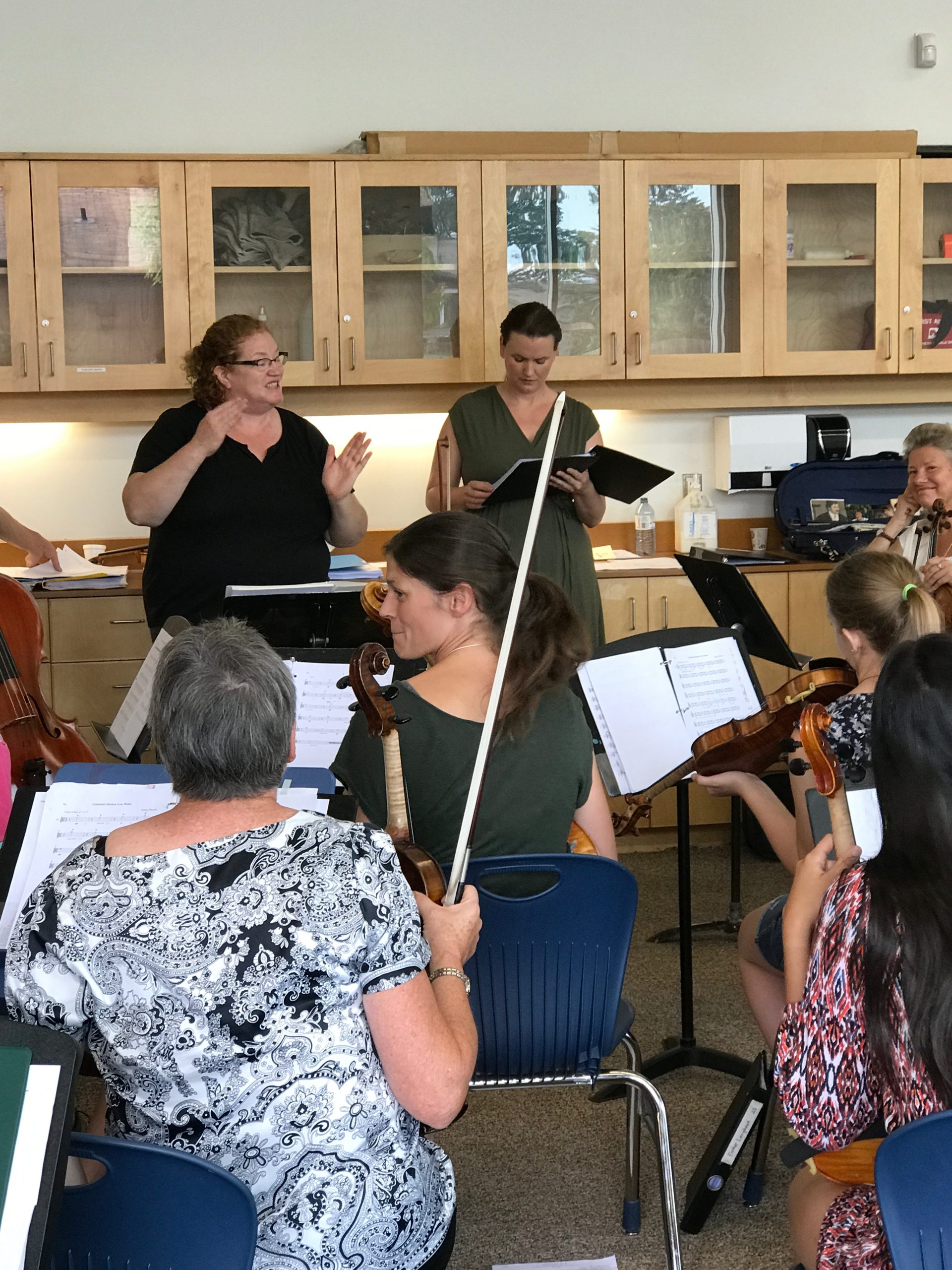Recently, the Orchestra North Summer Program invited CMC BC‘s Stefan Hintersteininger to participate in their 2017 summer session in Smithers, BC, as part of an exciting new community partnership we’ve formed with this dynamic organization. We wanted to help document some of the incredible work that is being done by these highly dedicated and passionate musicians up in the Skeena region of BC. Stefan’s blog about his experiences and what he observed there, follow:
I arrived in Smithers very early on the morning of Wednesday, August 9th. The town of Smithers, located in the lovely and scenic Bulkley Valley about 370 kilometres north-west of Prince George, is flanked on either side of the valley by breath-taking mountains including the mighty Hudson Bay Peak. Due to heavy smoke from the many wildfires afflicting the province, visibility was greatly reduced for much of the week, but, as I soon found out, it takes much more than a little smoke to deter the hardy faculty, students and volunteers of the Orchestra North Summer Program from their mission.
Literally within minutes of stepping off the plane, I was conscripted to participate in a dizzying array of orchestras and chamber ensembles. Among the works rehearsed on my first day were Arise (Psalm 68), a triumphant, joyful orchestral illumination of the famous hymn, composed by Langley-based educator, violinist and composer, Kent Dykstra. The piece had been arranged in such a way that musicians of varying degrees of experience, from beginner to advanced, could all participate in the mass orchestra experience.
Also on the docket for the day’s rehearsals were Aaron Copland’s exuberant Hoe-Down from Rodeo, Antonín Dvořák’s 9th Symphony (From the New World) and Arturo Márquez’s Danzón No.2, all conducted by Okanagan Symphony Music Director Rosemary Thomson. Ernest Bloch’s dramatic Suite for Strings was led by beloved violinist and faculty member Mary Sokol Brown, and Wolfgang Amadeus Mozart’s Divertimento No.1 was conducted by ONSP Founder, Artistic Director and viola faculty member Roxi Dykstra. In the midst of all this activity, I somehow found myself also spontaneously coaching a highly enthusiastic ensemble of teenagers who were tackling no less ambitious a work than Mozart’s Clarinet Quintet!
That same afternoon, Composer in Residence Rodney Sharman gave the final one of a planned series of three lectures on composition and aesthetics. In this session, Rodney addressed difficulties arising from setting English words to music, and suggested solutions. In particular, he noted, the selection of texts is crucial; a composer should choose words whose sounds lend themselves best to being sung. A great poem may not necessarily be a great choice for musical setting. Rodney’s highly engaging presentation, which included score study of several of his own choral works (Winter Solstice, Song about Forgetfulness, and Obsessions) had the twenty or so participants (which included a number of non-composers) quite enthralled. Rodney concluded the seminar by having the class sight-sing Arvo Pärt’s short SATB work Solfeggio, demonstrating that a well-written piece comes to life very quickly.
The music of Rodney Sharman was featured prominently throughout the ONSP’s week-long session. The orchestra performed three songs for voice and string ensemble, Obsessions, Liebesleid (Modern Love Waltz), and Song from Faust featuring soprano Eleonora Higginson and conducted by Rosemary Thomson. These heartbreakingly beautiful pieces, with delicate textures in the string writing showing off Rodney’s masterful orchestration skills to full effect, are somewhat reminiscent of Richard Strauss’ Four Last Songs in their rather valedictory feeling. It was surely the first opportunity many of the younger players had ever had to play music by a living composer who was in the same room with them, giving context to the compositions and advising the ensemble on various questions of interpretation and style.
The Spirit of the North Music Festival portion of the week began on Thursday, August 10th, heralded by a much-anticipated alpenhorn duet performance on Main Street, and continuing with Classics on Main – a series of walk-about, rotating mini-concerts with more than twenty small student chamber ensembles performing at various venues throughout downtown Smithers. The three-day Spirit of the North Festival itself included a dizzying array of more than 10 different concerts per day, ranging from informal outdoor performances to full symphonic gala concerts, as well as folk and jazz bands, and quite literally everything in between. Highlights of the festival were many. Turning Point Ensemble gave us a thrilling evening of dazzling virtuosity, including performances of works by Rodney Sharman (Notes on ‘Beautiful’) and Rudolf Komorous (About Scales). Percussion faculty member Katie Rife gave a lovely presentation entitled Meet the Marimba to a capacity, standing-room-only audience at the Smithers Art Gallery. Katie aptly demonstrated the many sounds and textures that the marimba is capable of, to the delight of the many children and young people in attendance.
At the same venue, the young cellist and composer Nicholas Denton-Protsack gave a revelatory performance of his extraordinary new work for solo cello and electronics, Cosmology. Originally inspired by NASA field recordings of radio emissions from space, Cosmology, a substantial piece in five movements, eventually became a composition intended to conceptually mirror the structure and chronology of the universe itself. The piece was stunningly bold, original, and instantly engaging, leaving no doubt that Denton-Protsack, who is soon to begin his graduate studies at the San Francisco Conservatory, is someone to keep a close eye on.
The enthusiastic local audiences clearly enjoyed the festival’s many and diverse offerings. Someone remarked that the festival, in one way or another, had reached nearly a quarter of the population of Smithers!
By Stefan Hintersteininger, BC Head Librarian, Canadian Music Centre

